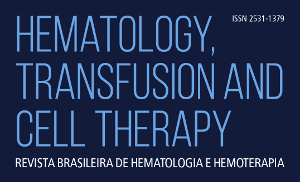ABSTRACT
Introduction:
The Glanzmann Thrombasthenia (GT) and Bernard-Soulier Syndrome (BSS) are rare hereditary disorders of platelet function. Their treatment often requires platelet transfusion, which can lead to the development of alloantibodies.
Objective:
In this study, we aim to develop a strategy for alloantibody detection and to describe the frequency of alloimmunization in a patient population from a single center in southeastern Brazil.
Methods:
Samples from patients with GT or BSS were tested using the Platelet Immunofluorescence Test (PIFT). If a positive result was obtained, a confirmatory step using the Monoclonal Antibody Immobilization of Platelet Antigens (MAIPA) and Luminex bead-based platelet assay (PAKLx) was executed. Main results: Among 11 patients with GT, we detected the presence of alloantibodies in 5 using PIFT, with confirmation through MAIPA and PAKLx in 2 (1 anti-HLA and 1 anti-HPA), resulting in a frequency of 18.1%. Among 4 patients with BSS, PIFT was positive in 3, with confirmation by MAIPA and PAKLx in 1 (anti-HLA), showing a frequency of 25%. The two patients with anti-HLA antibodies exhibited a panel reactive antibody (PRA-HLA) testing greater than 97%.
Conclusion:
Our study highlights the importance of identifying platelet alloimmunization in this patient population. The proposed algorithm for platelet alloantibodies detection allows resource optimization.
Keywords:
Bernard-Soulier syndrome; Alloantibodies; Thrombasthenia; Antigens; Human platelet; Algorithms; Platelet transfusion

 Thumbnail
Thumbnail
